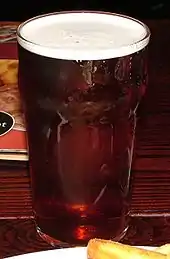Bitter (beer)
Bitter is an English style of pale ale that varies in colour from gold to dark amber, and in strength typically from 3% to 5.5% alcohol by volume.[1]

History
The term "bitter" has been used in England to describe pale ale since the early 19th century. Although brewers used the term "pale ale", before the introduction of pump clips, customers in public houses would ask for "bitter" to differentiate it from mild ale; by the end of the 19th century, brewers had begun to use the term as well.
During the 20th century, bitter became the most popular type of draught beer sold in British pubs and has been described as "the national drink of England".[2] In Scotland, bitter is known as either "light" or "heavy" depending on the strength, colour and body.
Bitter is traditionally cask conditioned and either dispensed by gravity through a tap in the cask or by a beer engine at "cellar temperature" of 11 to 14°C (50 to 55°F). The popularity of craft brewing in North America has led to British-style bitter being brewed there since the 1980s.[3]
Style
Bitter belongs to the pale ale beer style and can have a great variety of strength, flavour and appearance, from dark amber to a golden summer ale. It can be under 3% abv and as high as 7% with premium or strong bitters. The colour may be controlled by the addition of caramel colouring.[4] It is similar to the India pale ale style of beer, though bitters are less hoppy. A 2020 survey by SIBA found that in 2020 the average bitter beer strength in the UK was 4.2%.
Sub-types of bitter
- Light ale
- A low alcohol bitter, often bottled.[5]
- Session or ordinary bitter
- Strength up to 4.1% abv. This is the most common strength of bitter sold in British pubs. It accounted for 16.9% of pub sales in 2003.[6]
- Best or special bitter
- Strength between 4.2% and 4.7% abv. In the United Kingdom bitter above 4.2% abv accounted for just 2.9% of pub sales in 2003.[6] The disappearance of weaker bitters from some brewers' rosters means "best" bitter is actually the weakest in the range.
- Premium or strong bitter
- Strength of 4.8% abv and over.
- Golden ale
- Golden or summer ale has an appearance and profile similar to that of a pale lager.[7] Golden ale is typically brewed without the use of crystal malts, or at least in far lower quantity to a traditional bitter. In 2020, 83.5% of SIBA member breweries were producing 'pale golden bitter' [8]
See also
References
- Pattinson, Ron (2004). "Beer, ale and malt liquor: old British beer terminology". Xs4all.nl.
- Oliver, Garrett, ed. (2012). The Oxford Companion to Beer. Oxford University Press. pp. 129–130. ISBN 978-0-19-536713-3.
- Oliver, Garrett, ed. (2012). The Oxford Companion to Beer. Oxford University Press. pp. 129–130. ISBN 978-0-19-536713-3.
- "Caramel color: the science and art" (PDF). DDW Global. 2001. Archived from the original (PDF) on 28 August 2016. Retrieved 25 August 2010.
- "Michael Jackson's Beer Hunter - Beer Styles: Light Ale". Beerhunter.com. Retrieved 22 March 2014.
- "Statistical Handbook". Statistical Handbook / A Compilation of Drinks Industry Statistics. British Beer and Pub Association: 21. 2003. ISSN 1475-3545.
- "Hop Back Summer Lightning " Beer Culture with Des de Moor". desdemoor.co.uk. Retrieved 5 June 2010.
- "SIBA British Craft Beer Report 2020" (PDF). 2020.
External links
 Media related to Bitter (beer) at Wikimedia Commons
Media related to Bitter (beer) at Wikimedia Commons